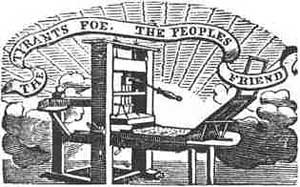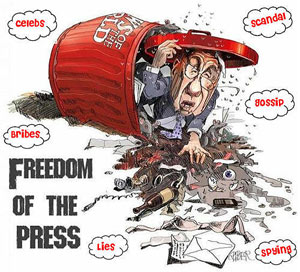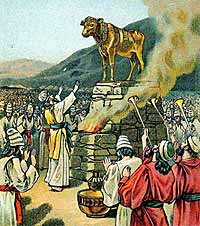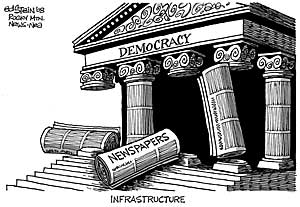Is “freedom of the press” as important to our society as claimed?
It’s universally acknowledged that a free press is an essential part of a well functioning democracy.
Without a free press political and corporate corruption will be hidden from the public and therefore voters will be unable to make well informed decisions at election time.
But is the fact that the press is free to report on whatever it wants to, enough to ensure a well functioning democracy?
Absolutely not.
But even if it were enough, can’t we do any better than just “enough”?
I think we can.

Most owners of media companies will rail against the slightest hint of government intervention or regulation and chant the holy mantra of “freedom of the press” in an attempt to convince the public that freedom of the press is the most holy of holies in the cannon of western democracy.
They defiantly insist that the slightest, freedom-reducing, tweak to media regulations would also leave us worse off. They hold up this sacred cow and insist that it’s protecting us from government excesses and corruption.
But I think they’re wrong.
Freedom of the press isn’t enough. It’s not even close to being enough.
I’ll even go as far as to say that it’s not even relevant.
I’ll prove it to you right now by demonstrating that a society can have a free press which has a very negative effect on democracy and society.
Imagine a society which has laws enshrining the freedom of the press. Imagine that over a period of time the smaller newspapers have all been purchased by one large company so that there is now only one newspaper.
Imagine that the newspaper owner has strong political views and always sides with one political party.

Imagine that he employs only editors, journalists and political commentators that share his political views.
Imagine that the newspaper continuously ignores the achievements of the opposing political party yet loudly trumpets the slightest achievements of their favoured political party.
Imagine that they always make a big story about the smallest of mistakes made by the opposing political party while ignoring or playing down any mistakes by their favoured party.
Imagine that the newspaper repeatedly prints factual inaccuracies about the opposing political party on their front page stories and only ever prints corrections of the errors 3 months later on page 72.
“Freedom of the press” enshrines the right to do all of the above.
Doing all of the above will corrupt and cripple a democracy.

You don’t even need extreme concentration of media ownership to get into this terrible situation. It wouldn’t matter if there were 5 newspapers and 5 television channels in the abovementioned society, because if they all supported the same political party and all engaged in the abovementioned biased reporting practices the problem would be the same.
This thought experiment (which bears an unfortunate resemblance to the situation in some Australian cities) proves two things:
- A free press is not sufficient to guarantee a well functioning democracy.
- We can’t even guarantee that a free press is good for democracy – it may be good, neutral or bad for democracy.
What’s really going on?
The introduction of a free press into a society may improve the functioning of its democracy, but it isn’t the aspect of “freedom” that brings the benefit.
Press freedom often ensures that the public is exposed to a diversity of opinion, and it is this diversity of opinion that is often touted as the vital ingredient for a successful democracy – but that’s not it either.
It’s neither freedom nor diversity that are important – “truth” is the vital ingredient.
The reason that freedom of the press usually benefits democracy is that when you have freedom of the press you usually have a diverse range of opinions; and when you have a diverse range of opinions you have a higher probability that one of those opinions exposes the public to the actual truth.
You could have a diverse range of opinions but if they’re all spouting lies and rubbish then the truth will still remain hidden.
Therefore, we shouldn’t care too much whether our media is free, or whether it exposes us to a diversity of opinions.

What we should really care about is whether our media is giving us the truth – and not just partial truths, but all aspects of the truth.
It’s not sufficient to just give us the surface truths: “he said this”, “she said that”. We need to have the underlying layers of truth explained to us as well. For example:
- “He said this, but he also said that, and the two are self-contradictory so they can’t both be true”
- “He said this and he owns that company which will make increased profits if he can convince the government to make that happen.”
I call this level of truth “deep-truth”. While some of the media strive to deliver this level of deep-truth, I believe the majority are content with the surface level truth of “he said – she said” reporting. Maybe most journalists see deep-truth as a desirable goal but are prevented from pursuing it by their superiors or simply by time constraints – I don’t really know what it is, but it sure is annoying.
My mission is to help change society’s views about what the ideal media landscape looks like, so that hopefully, one day, our media can start becoming more deep-truth oriented.

I’m not saying that we should get rid of freedom of the press. I’m saying that if the current free press is not adequately exposing the public to the truth, and if the only way to get more truth is to have less freedom then that’s a sacrifice we should willingly make.
The sacred cow of “press freedom” is not more valuable than the public’s ability to access the truth!
What do you think?
Please leave your comments below.
If you write a well thought out comment, I may promote it to a post and add my own clearly marked comments about what you have written.
In future posts I’ll be writing about real life examples of poor journalism and explaining how a deep-truth focused journalist would have reported the story.
If you have examples please send them in using the “Submit Article” link.
The media is just one topic that I’ll be blogging about. I’ll also write articles about politics, society, current affairs and life in general. But regardless of the topic the common thread will be “striving for improvement through logical analysis”.
Help spread the word
Please help me get this subject onto the public agenda by sharing this article with your friends and using the social bookmarks below.
 Logical ideas and commentary about society, politics
Logical ideas and commentary about society, politics 

Interesting blog and very well expressed. I agree to the extent that I often refer to journalism as ‘responsible truth seeking’ and ‘responsible truth telling’. My only problem with your proposition is that I know of no society in history where the media (or the citizenry) has had their free expression shackled and all truths have been allowed to be told. Cheers, and happy blogging! – Mark Pearson
Hopefully we keep improving societies – we keep learning from the mistakes of the past and striving to create an even better society than has ever existed before. If we are to do so then we need to keep our eye on what the ideal solution would be, so that we can compare it to the solution we currently have, and then think about how we can implement something that is closer to the ideal.
We also need to need to bear in mind that the goal is not to just to ensure that the truth can be told, but that the truth can be heard by as many people as possible.
A system that allows the truth to be told, but only allows a few people to hear it, and feeds a stream of lies to the majority of people is next to useless.
I’m aware of the dangers of censorship, but I don’t think we should be defeatist and allow that fear to prevent us from striving to find a solution that is closer to the ideal.
I’d like people to have a clearer idea of what the ideal solution is, because it seems like a lot of people are currently under the misapprehension that the ideal is “freedom of speech”.
I agree.
But people lose their jobs or disappear.
It is up to organisations/like minded people to ‘police the police’.